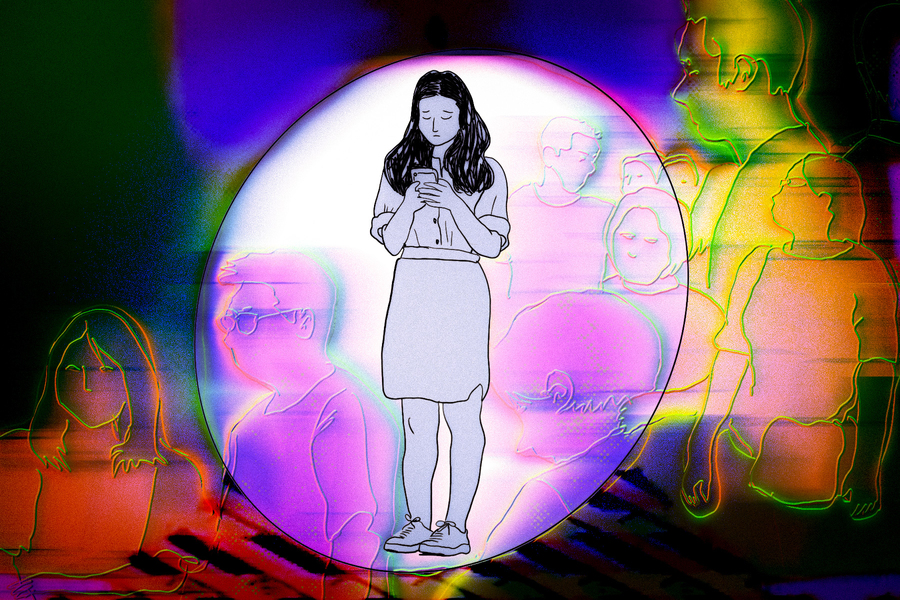
Jose-Luis Olivares/ MIT
Over the past five years, the number of social media users has rapidly increased from 3.51 billion to 5.17 billion. The escalating volume of users and time spent on social media platforms is only projected to grow, raising concerns about their significant impact on society. Social media has evolved from characters being tapped on a simple telegraph machine to a series of platforms that dominate daily interactions through algorithmic manipulation. By pressuring users into perfectionism, promoting co-comparison and social displacement, and redefining the concept of community, social media has transformed society’s perception of social identity and cohesion.
As users scroll through apps such as Instagram, Facebook, Twitter, and Tiktok, they are inundated with meticulously posed selfies, flawless photos, and perfect plates, encouraging users to carefully curate an idealized version of their lives. While these platforms can be a convenient way to connect with others, they expose vulnerable users, specifically youth to a distorted version of reality. The constant perpetuation of an unrealistic life, particularly unattainable body ideals result in feelings of low self-esteem, anxiousness, and depression.
Studies report that over 87% of women and 65% of men compare their bodies to images seen on social media, highlighting the profound effects of social media on self-perception. Social media promotes a need for validation which influences individuals to maintain unreasonable lifestyles and promotes cycles of social comparison.
Social media platforms are designed to keep users scrolling and through its’ reinforcing nature it activates the brain’s reward center. Every like, comment, share, and notification causes the body to release dopamine as users post content with the hope of receiving a potential reward, positive feedback and validation from others. The uncertainty of who will comment or how many likes a post might get result in compulsive attachment to these platforms.
This expedites the phenomenon, social displacement, where increased social media use replaces time spent in face-to-face interaction. Individuals become increasingly engrossed in their virtual world whether this is through mindless scrolling or active engagement, ultimately contributing to their negative well-being and extreme feelings of loneliness and isolation. The shift from real-life connections to meaningless engagement reshapes how individuals view their identity and relationships.
Despite the manipulative aspects of social media and their consequences, platforms have fostered a community and sense of belonging for many. Platforms that create virtual spaces such as Reddit, allow users to form communities based on their interests and identities, regardless of their geographical boundaries. For many, these online groups create opportunities for connection and provide a sense of identity and support. Studies reveal that participants were more likely to turn to their virtual support network during times of stress, rather than confiding in parents or mental health professionals, highlighting the duality of social media as it replaces traditional forms of connection.
Social media has undoubtedly revolutionized society’s understanding of self identity and group dynamics, through transforming self-expression, amplifying social comparison and social displacement, and reshaping the concept of community. While these platforms offer opportunities for connection, they also present concerns that require attention and action. The ultimate question remains: does this transformation enhance human connection or does it hinder social cohesion?
Works Cited
“Social Identity Theory.” Encyclopædia Britannica, Encyclopædia Britannica, Inc., 22 Oct. 2024, www.britannica.com/topic/social-identity-theory.
Ortiz-Ospina, Esteban, and Max Roser. “The Rise of Social Media.” Our World in Data, 18 Mar. 2024, ourworldindata.org/rise-of-social-media#:~:text=There%20were%2C%20of%20course%2C%20earlier,make%20friends%20with%20other%20users .
D;, Hall JA;Liu. “Social Media Use, Social Displacement, and Well-Being.” Current Opinion in Psychology, U.S. National Library of Medicine, pubmed.ncbi.nlm.nih.gov/35395533/.
Elsayed, Walaa. “The Negative Effects of Social Media on the Social Identity of Adolescents from the Perspective of Social Work.” Heliyon, U.S. National Library of Medicine, 21 Feb. 2021, www.ncbi.nlm.nih.gov/pmc/articles/PMC7905185/.
“The Power of Groupthink: Study Shows Why Ideas Spread in Social Networks: Haas News: Berkeley Haas.” Haas News | Berkeley Haas, 9 Feb. 2021, newsroom.haas.berkeley.edu/research/the-power-of-groupthink-study-shows-how-easy-it-is-to-influence-social-networks/.
“Can Social Media and Online Communities Be Good for Us?” Psychology Today, Sussex Publishers, www.psychologytoday.com/au/blog/the-science-of-fandom/202303/can-social-media-and-online-communities-be-good-for-us.
“Just How Harmful Is Social Media? Our Experts Weigh-In.” Columbia University Mailman School of Public Health, 14 Mar. 2023, www.publichealth.columbia.edu/news/just-how-harmful-social-media-our-experts-weigh.
“Reducing Social Media Use Significantly Improves Body Image in Teens, Young Adults.” American Psychological Association, www.apa.org/news/press/releases/2023/02/social-media-body-image.
“Social Media & Suicide.” Social Media Victims Law Center, 27 Sept. 2024, socialmediavictims.org/mental-health/suicide/.
